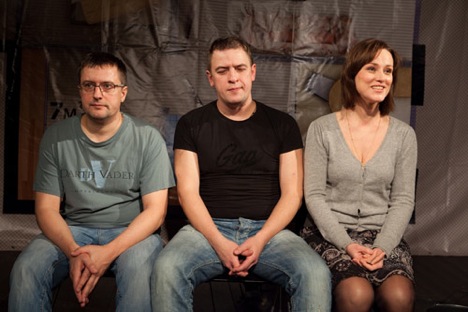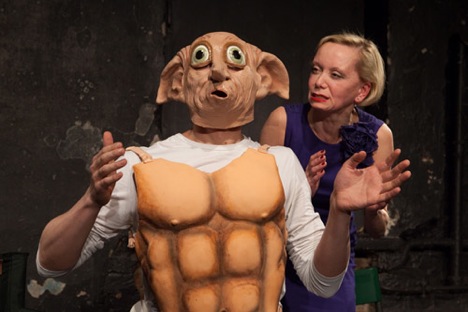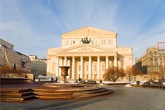Khodorkovsky, Putin and Stalin in modern theatre

‘Dvoye v tvoem dome’ (Two in Your House) is among Teatr.doc best know productions. Source: Polina Korolyova / Teatr.doc
“Mainstream Moscow theatre avoided politics like the plague, up until Konstantin Bogomolov began doing his shows,” John Freedman, a Moscow-based theatre critic told RIR. Bogomolov used the performances he staged to express his thoughts on important political issues to a mass audience. If it weren’t for Bogomolov’s publicity and skill, the people “might not have been interested or willing to listen to some of these things or to watch them,” Freedman said.
Bogomolov's kitschy and extravagant production based at Fyodor Dostoyevsky's ‘Karamazov Brothers,’ a harsh satire of contemporary Russian life, from politics to religion, stirred up a controversy last fall and lead to a conflict with the management of the Moscow Arts Theatre, which hosted the performance. According to Bogomolov, the management tried to censure the production, to which he reacted by resigning from the theatre.
Roots of the phenomenon
The beginnings of Russian political theatre date back to the 1960s and 1970s when there were basically two kinds of political theatre in the Soviet Union.
Official productions glorified the leaders of the 1917 Bolshevik Revolution and life under the Socialist system in plays, while dissident-minded directors Yuri Lyubimov and Mark Zakharov at the Taganka and Lenkom theatres made cautious steps towards discussing political and social issues in their productions, operating within the confines allowed by the censors. One may remember ‘Hamlet’ starring famous bard Vladimir Vysotsky, or ‘Dictatorship of Conscience’ by Mikhail Shatrov.
After years during which everyone seemed to be tired of everything political, Kirill Serebrennikov's 2004 adaptation of ‘Les’ (Forest), a classical play of 19th century, staged in the Moscow Arts Theatre, was by many viewed as a precursor of new political theatre in Russia. At the end of the performance, the actors playing two main characters entered the stage made up as pop diva Alla Pugacheva and President Vladimir Putin, while Serebrennikov's rendition of the play also made comments on a range of current issues, from nostalgia for the Soviet era to prevalence of low-brow culture.
Small theatre, big politics
However, yet two years earlier, Teatr.doc was formed in Moscow by playwrights Mikhail Ugarov, Yelena Gremina and Alexander Rodionov, which went on to become the most remarkable political theatre troops, operating on the crossing of documentary theatre and experimentation. The actual play-house of Teatr.doc is quaint and can welcome only up to 100 guests.
“Teatr.doc is the granddaddy of political theatre in Moscow,” John Freedman says. “Teatr.doc is definitely the most active, the most innovative and the most searching in terms of making a political statement.” He added that in its semi-theatrical performances based on a political issue Teatr.doc is “using theatre to bring awareness to political issues.”
Among Teatr.doc's best known productions are Ugarov's ‘Chas vosemnadsat’ (One Hour and 18 Minutes), centred on the late Sergey Magnitsky, formerly an auditor for The Hermitage Capital investment advisory firm, believed to be killed in prison, and Maxim Kurochkin's ‘Dvoye v tvoem dome’ (Two in Your House) about Vladimir Neklyayev, a Belarusian presidential candidate who lost in the 2010 election and was kept under house arrest for several years after that.
Another famous political performance at Teatr.doc was ‘BerlusPutin,’ based on Italian playwright Dario Fo's ‘The Two-Headed Anomaly’ about Silvio Berlusconi and Putin and heavily adapted for the Russian audience by director Varvara Faer.

‘BerlusPutin’ perfomance by Teatr.doc theatre. Source: Polina Korolyova / Teatr.doc
Different faces of political playwriting
Among other political statements in a theatre form is, certainly, Vladimir Ageyev's staging of Natalia Moshina's ‘Zhara’ (Heat) at the Praktika theatre, focused on a story of fictional terrorists seizing an office of a large company and making political demands.
Also worth mentioning is veteran director Vladimir Mirzoyev, known for politically-charged productions, including his rendition of Harold Pinter's ‘The Homecoming’ staged in Mayakovsky Theatre, in which the main character looks like Joseph Stalin who came back from the dead to visit our realm. However, Mirzoyev has more interest in archetypes and political mythology rather than its “current, superficial side,” as he put it himself. It has been also made public that Mirzoev is planning on staging a play based on Mikhail Khodorkovsky’s biography.
On the other side of the political theatre's spectre is Sergei Kurginyan, who has been running an experimental theatre centre since the mid-1980s and has been known for his conservative and pro-government views. In defiance of stereotypes, political theatre cannot just be protesting and leftist, but also conservative and loyal to the powers that be.
All rights reserved by Rossiyskaya Gazeta.
Subscribe
to our newsletter!
Get the week's best stories straight to your inbox

